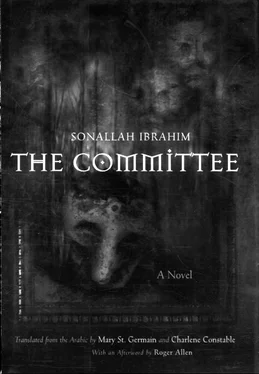"Of course, most probably, they were intended to immortalize the names of pharaohs and preserve their bodies. Undoubtedly, the obvious goal in building the pyramids was to provide eternal tombs. Even though Cheops, more than any other king in history, succeeded in immortalizing his name, the basic goal of preserving the body was not fulfilled. His body disappeared in spite of the ingenious network of passages and chambers deliberately concealed during construction.
"From Herodotus, we know that the stones used to build the Great Pyramid were moved on the Nile River, then along a causeway built by one hundred thousand workers over a ten-year period. After that, they were raised level by level by means of hoists made of short poles.
"There is no evidence that the Egyptians used mechanical tools more advanced than the hoist and pulley and the incline during any period of their history. Because of this, most scholars tend to believe the size of the building and its precision prove that secret mechanical tools, now lost forever, were used in its construction. Perhaps this was the source of the conflict which arose over the Israelites' role in the construction. Some say that in reality Cheops was an Israelite king, although he concealed the fact in accordance with the customs of that people. Having been unceasingly oppressed since the dawn of history, they maintained complete secrecy in all their dealings in order to protect themselves. Others say that Cheops was only an Egyptian pharaoh, but that he made use of Hebrew genius to solve the knotty problems generated in building this architectural marvel.
"The engineering characteristics of the Great Pyramid prove a thorough knowledge of the science of engineering and a well-developed creativity and originality. These traits were not common in Egypt. Because of this, it is likely that Israelite technical expertise was sought. Some assert that the Israelites were slaves of Cheops and were forced to build the pyramids. This argument is disputed, although it is difficult to deny the despotism of the Egyptian pharaohs through history. However, it is hard to imagine how a structure of such magnitude and precision could result from forced labor. It was more likely the product of a deep faith in a religion which made the pharaohs god-kings.
"Therefore we prefer the theory that Cheops was the secret king of the Israelites. Especially since we know that the engineer who supervised building the pyramid, Ham-Ainu, was Cheops's cousin.
"In any case, this monumental building, composed of 2,300,000 pieces of stone, attests to the genius of its builder. There is some indication that copper saws, each nine feet long, were used to cut large stone blocks. If these blocks were cut into small sections, each one foot long, and placed side by side, they would reach onethird of the way around the earth at the equator.
"It is also certain that cylindrical drills were used to section the stone blocks. In fact, modern drills cannot approach the precision and perfection produced by those of the great builders five thousand years ago. This alone is a true miracle."
I felt the tension clouding the room lift and the hostile atmosphere ease. The Committee members had listened to me with intense interest; even the fat man sitting at one side lowered his eyes from the ceiling for the first time and fixed them on me. When I finished, one of the officers looked at me with approval, which cheered me up. The members stirred and consulted in whispers. Then I noticed I was still naked from the waist down. Tentatively, I reached for my shorts. Since nobody stopped me, I quickly put on both my shorts and trousers.
It seemed that they had finally settled on the opinion the pa_e man had whispered in the chairman's good ear. Indicating the papers I had given them, he said, "You may take these things now. We have no questions. When we reach a decision, we'll let you know."
I picked them up, trying to appear confident of the decision they would issue, but I had butterflies in my stomach. Drained of all feeling, I moved mechanically. I stuffed the papers into my briefcase, closed it, and took it in my left hand, bearing in mind what had happened to me at the beginning of the interview. I bowed silently to the Committee and headed for the door. I grasped its handle with my right hand and was delighted when it opened easily. I left the hall, not forgetting to close the door behind me, set my briefcase on the floor, and eagerly lit up a cigarette.
I knew I would not enjoy a moment's peace, sleeping or waking, until the Committee had issued its final decision in my case.
Several months had passed since the interview, during which time I had fallen prey to shifting moods of hope and despair. I would awake mornings absolutely certain the Committee would decide in my favor. Within hours doubt would begin to gnaw at me, and I would relive every moment of the interview. Then, giving up altogether, I would slide into complete hopelessness.
There was no way to find out where the Committee stood concerning me or where its deliberations would lead. It even occurred to me to try to see that single woman on the Committee, but I couldn't imagine she'd be so foolish as to come right out and tell me what I wanted to know. To get this information I'd have to go too far, and remembering her sallow face, I lost all desire to meet her. Although I had been involved in several things at odds with my principles in one way or another, such as submitting to the humiliation I had suffered at the "hand" of the Committee, I hadn't sunk quite so low as to lead a woman on with false flattery. It wasn't a matter of a reasoned decision, as much as a psychological bent. Even if I could do such a thing, what would save me from having to go all the way? In view of my past history, which the Committee had ridiculed, that would surely turn into a disaster.
There was nothing to do but wait. I hung around the house, rarely going out in case the Committee sent me its decision, whether yea or nay, or summoned me.
I was about to eat dinner one evening, when I received a confusing telegram. Instead of a summons or a brief notification of the final decision, it contained these words, "We await a study on the greatest contemporary Arab luminary."
My slight knowledge of the Committee's methods indicated that I faced unique, unprecedented procedures. The Committee's custom was to determine in one and only one interview the fate of anyone whose luck had led him before it.
This strange reversal of tradition could only be explained by assuming there was a split decision in my case. The new assignment must have been motivated by the strength of my position. The Committee undoubtedly intended it to persuade my opponents (among them, certainly, the ugly Stubby) and to give me a fresh opportunity to display my talents.
This interpretation raised my morale only until I realized here was another side to the coin. On the contrary, why couldn't it be the weakness of my position that made the Committee grant me a second opportunity in order to satisfy those holding out on my behalf? Based on this, the assignment probably wouldn't be particularly worthwhile, being merely a pretext to stall the decision that had already been reached.
Before I despaired completely, a third likelihood occurred to me: that the Committee had incorporated some change in its procedures. I hadn't heard of it, of course, since newspapers give the Committee a wide berth.
I was inclined to accept this explanation, because the reques_ed study would be presented in writing and so would show how well I knew the Committee's language. The Committee had not previously been interested is this aspect of its interviewees' talents.
After that I examined the telegram, looking for the traps for which the Committee was notorious. I found plenty of them. First, the study didn't have a set time or length. Did they want a quick sketch such as is published in the newspapers, or an academic study hundreds of pages long? Likewise, "luminary" was not defined. Could it mean fame, or specific achievements, and if so, what type? And at what level: personal or public, and in what field?
Читать дальше











